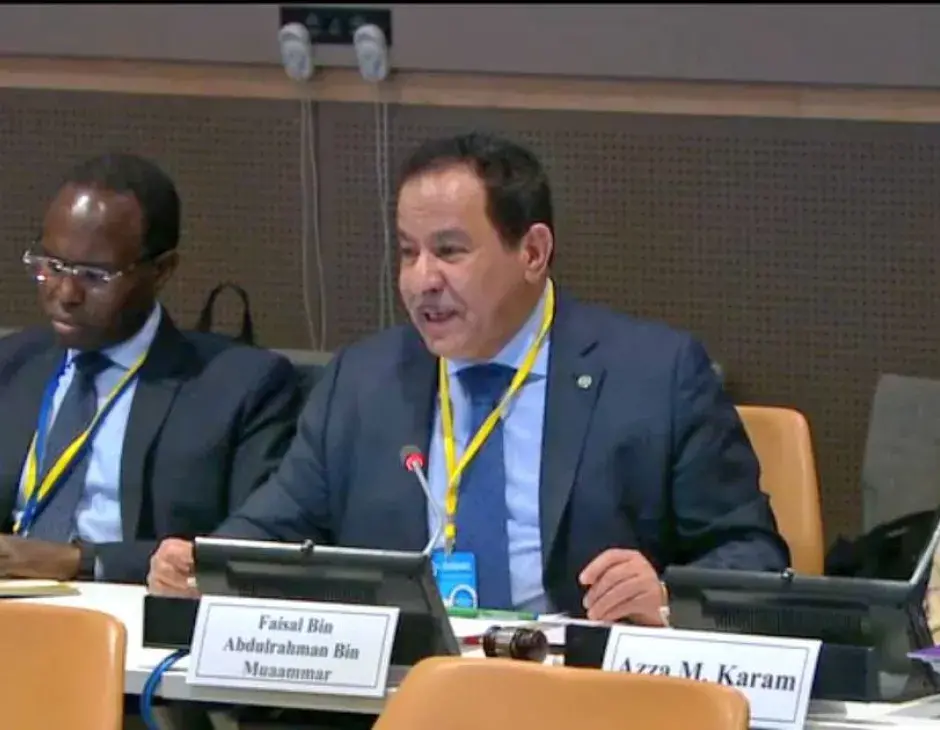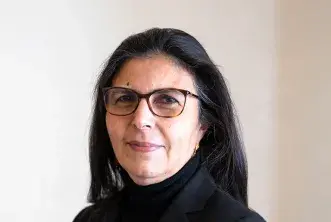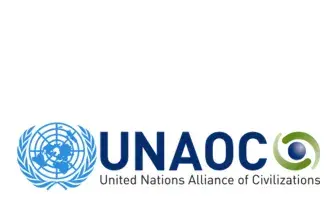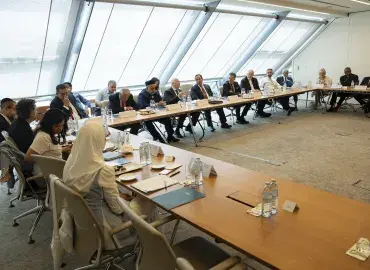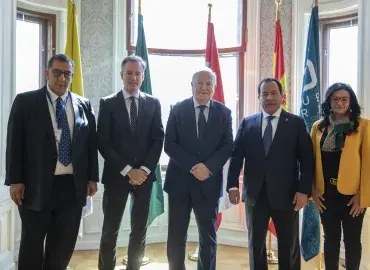KAICIID SG Speech: 8th Global Forum of the UNAoC
Breakout Session 4: “Many Cultures, One Humanity:
The Role and Responsibility of Religious Leaders and Faith-Based Organizations in Building Peaceful and Inclusive Societies”
UNHQ - New York - 20 November 2018
Excellencies, Ladies and Gentlemen,
It is my pleasure to be among so many leaders dedicated to building and sustaining peace within and across communities.
I would like to thank the UNAOC, one of KAICIID’s long-standing partners, for hosting this significant annual forum for the eight consecutive year.
We take pride in our partnership with the Alliance and our mutual commitment to interreligious and intercultural dialogue.
This year’s Alliance Global Forum theme is extremely relevant to our work at KAICIID, “Commit to Dialogue: Partnerships for Prevention and Sustaining Peace”.
Our partnerships have been the key to our success.
I would also like to take this opportunity to thank the UN for recognizing the increasingly vital role that religious actors and FBOs are playing in the world arena and in the implementation of the 2030 Agenda for Sustainable Development.
The Advisory Council to the UN Inter Agency Task Force on Religion and Development, of which I am proud to be a Co-Chair, is giving a voice to the 84% of the world’s population who have a religious belief or tradition, and is highlighting the tremendous force for good that religion represents in our world.
For those who are not familiar with KAICIID, we are an international dialogue center based in Vienna, Austria.
We are governed by a Council of Parties consisting of the Republic of Austria, the Kingdom of Saudi Arabia, the Kingdom of Spain and the Holy See as a Founding Observer.
Our Board of Directors is made up of nine prominent religious leaders from five major world religions – Islam, Christianity, Judaism, Hinduism, and Buddhism.
We are the first intergovernmental organization in the world to be governed by a Board of religious leaders.
Over recent years, I have personally seen a huge growth in awareness of the role religious leaders and religious communities play in conflict prevention and sustainable peace.
KAICIID has taken a leading role in highlighting the crucial importance of religious leaders, faith-based organizations and faith communities and the need for their inclusion at the policy-making level.
Let us bear in mind the following:
- 84% of the world’s population profess a religious belief or tradition. Religion matters to citizens, and therefore it must matter to those who govern.
- Religious belief is a powerful motivating factor and religious identity lives at the very heart of communities. This makes religion uniquely prone to manipulation for violence, but its power as a force for good is much greater.
- Religion is part of the solution, and not part of the problem.
A few weeks ago, violence in the north of the Central African Republic forced an evacuation of international and state aid organizations working there.
In one town, the only remaining figures of authority were the priests, the pastors and the imams. For the duration of the violence, they became the only administrators, judges, safe sanctuaries, doctors, and mediators left in the town.
The goal of KAICIID would be that the Imam, the Priest and the Pastor in this town be able to support each other and to provide a living example to its citizens of how interreligious coexistence and shared citizenship are possible.
To have the tools to identify and overcome hate speech or incitement.
To have the support they need to continue their work, and share their knowledge with policy makers and international organizations.
To be equal partners in the effort to build peace in the Central African Republic.
I think we all agree that this needs to be done, but what we need to agree on is how best to realise this aim.
To answer this question, I would like to provide three examples from our work:
- In the Arab region, we established the first-ever interreligious dialogue platform for Muslim and Christian religious leaders in over 1400 years.
KAICIID has also been instrumental in establishing a network of over 18 Muslim and Christian theological faculties and institutes in the Arab Region that actively teach interreligious dialogue as part of their curricula. This ensures greater understanding and appreciation of religious diversity in nations where Muslim and Christian communities have coexisted for over 1,000 years. - We actively work towards promoting the values of shared coexistence and citizenship through inclusive dialogue in communities with diverse religious and ethnic communities.
- We have established and continue to support interreligious dialogue platforms in four focus areas: the Central African Republic, Nigeria, Myanmar, and the Arab region, which provide safe spaces for followers of different cultures and religions to come together with religious leaders, in order to work together to promote dialogue for common or inclusive citizenship.
- We also support the Muslim Jewish Leadership Council in Europe, whose members come from Jewish and Muslim communities across Europe, and together advocate for the rights of communities.
We are now witnessing a significant rise in Islamophobia, anti-Semitism, xenophobia, and a worrying increase in political extremism. Both communities are being increasingly targeted by discriminatory policies that affect many aspects of their religious practices and traditions. - The last example I want to talk about is that of training. Religious leaders and faith-based organizations need to be trained on how to speak to policymakers, from an understanding of policy frameworks, human rights, sustainable development, to more logistical issues such as social media, and advocacy
At the same time, policymakers need training on religious literacy, interreligious dialogue and inclusion. This is what we at KAICIID are working towards through our Fellows Training Programme for mid-career interfaith actors, or through our online Dialogue Knowledge Hub.
In fact, I would like to take this opportunity to draw your attention to our first online course on interreligious dialogue specifically tailored for policymakers, which will be launched on our website in January.
In conclusion, I would like to return to our Pastor, Imam and Priest in the Central African Republic who are not only at the forefront in areas of violent conflict, but also in the war against poverty, against environmental degradation, against violent extremism and in countering political extremism.
How to support them, how to empower them, and how to maximize their ability to continue with what they are already doing: these are the questions we should be asking ourselves.
I look forward to the discussion.
VIENNA, 18 June 2019 - The High Representative for the United Nations Alliance of Civilizations (UNAOC), Mr. Miguel Angel…
VIENNA, 21 March 2019 – In the aftermath of the terrorist attacks on Muslim worshippers in two mosques…

